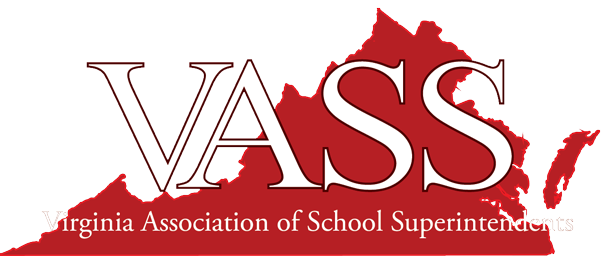FOR IMMEDIATE RELEASE
Contact: Ben Kiser, Executive Director, Virginia Association of School Superintendents
(804) 815-7661
VIRGINIA SUPERINTENDENTS RELEASE REFORM PLAN AND ANNOUNCE RESOLUTIONS TO FUND PAST AND FUTURE EXPECTATIONS FOR PUBLIC EDUCATION
Richmond, VA (January 15, 2015) – Virginia school superintendents held a press conference in Richmond today to release a comprehensive plan for education reform, which encompasses Virginia’s new expectations for public schools including those of the Governor; members of the General Assembly and the State Board of Education; Virginia’s parents, students and educators; and Virginia’s businesses and local governments.
In addition to the new reform plan, officers of the Virginia Association of School Superintendents announced that resolutions had been adopted by over 100 out of 132 local school boards to request that the General Assembly fully fund the state’s share of the standards that the General Assembly currently uses to define the quality of education – the Virginia Standards of Quality or SOQ. More school boards are expected to pass resolutions this month at their board meetings.
In announcing the release of the 61-page comprehensive plan entitled The New Blueprint for the Future of Public Education, Alan Seibert, Superintendent of Salem City Public Schools and President of the Virginia Association of School Superintendents (VASS), said that, “We are committed to ensuring a consistent, high quality system across the Commonwealth, but the era of 40-50 question multiple choice tests taken a prescribed moment in time being the primary tool has passed.” He continued, “Better approaches to assessment are available that are more commensurate with the need for creativity, critical thinking, and problem solving that are essential over and above recall of basic facts. We must ensure that all students have access to high quality learning opportunities, but must resist an over emphasis on standardization because we are in the business of unfolding the unique human potential of every child.”
Some of the far-reaching changes that the superintendents are advocating in the Blueprint include:
- Incentives for local school divisions to identify alternative ways for students to accrue standard credits outside of the traditional seat-time requirements and to identify additional opportunities to earn verified credits beyond passing end-of-course Standards of Learning (SOL) tests or State Board of Education-approved substitute tests;
- Flexibility in the scheduling of assessments to accommodate the different learning rates of students so that they not only become proficient in acquiring required knowledge and skills, but also accelerate their learning to acquire additional knowledge, more in-depth knowledge and enhanced skills;
- Revisions in the state curriculum that are aligned with research-based instruction and performance assessments that both develop in-depth understanding and cognitive skills, and show how students apply knowledge;
- A variety of meaningful, easy-to-understand measures to hold educators accountable in addition to test scores;
- Flexible learning schedules designed to enhance student and teacher performance as well as to improve the use of time throughout the year; and
- Virtual and blended learning opportunities for all students to enhance personalized learning;
VASS spokespersons made the point that while Virginia’s educators are being asked to innovate to meet the new expectations, they have experienced reductions in state funding over the last five years. Jennifer Parish, Superintendent of Poquoson City Schools and VASS Secretary/Treasurer, said that state K-12 funding had declined since the 2009 recession with state direct aid being reduced from $7.1 billion in 2009 to $6.8 billion in 2014.
Local school boards have seized upon the frustration of being asked to do more with less by passing resolutions requesting the General Assembly to “immediately increase the state’s share of funding for public education to the level of quality that is prescribed by them in the Standards of Quality and expected by all of the Commonwealth’s citizens.” Almost all of the state’s local boards are expected to pass resolutions requesting increased state funding by the end of January.
